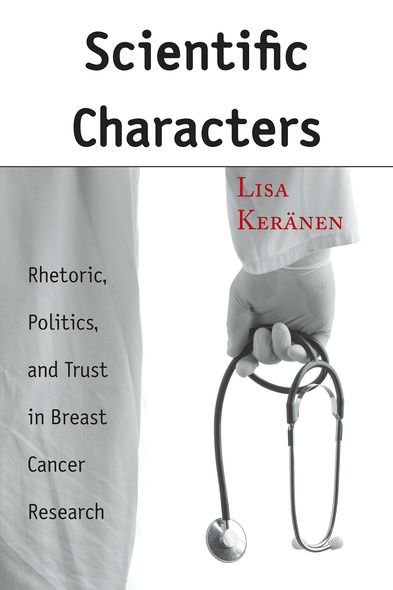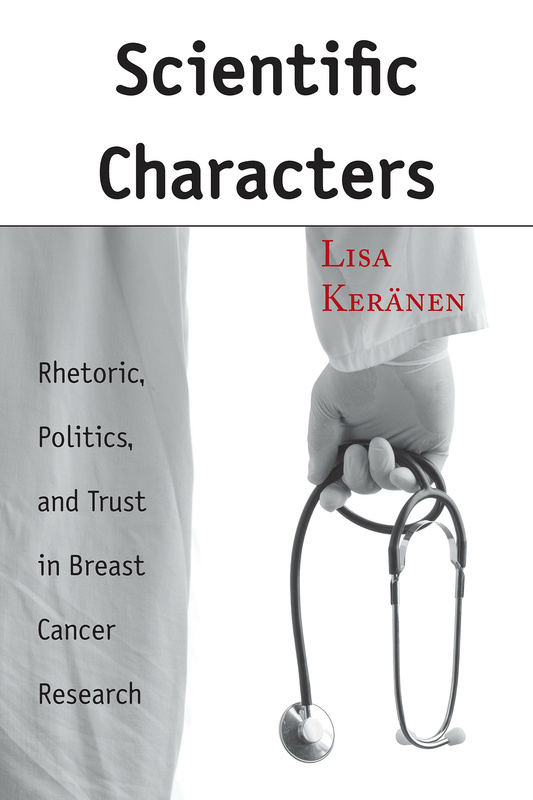Scientific Characters
Rhetoric, Politics, and Trust in Breast Cancer Research
By Lisa Keränen
University of Alabama Press
Scientific Characters chronicles the contests over character, knowledge, trust, and truth in a politically charged scientific controversy that erupted after a 1994 Chicago Tribune headline: “Fraud in Breast Cancer Research: Doctor Lied on Data for Decade.” In the aftermath of this dramatic news, Dr. Bernard Fisher, the eminent oncologist and celebrated pioneer of breast cancer research, came under intense scrutiny following allegations that one of his investigators falsified data in landmark breast cancer research. Although he was eventually cleared of all wrongdoing, the controversy called into question the treatment decisions of tens of thousands of women, because Fisher’s research had demonstrated that lumpectomy and radiation were as effective as breast removal for early stage cancers—a finding that was hailed as revolutionary in women’s health care.
Moving back and forth between news coverage, medical journals, letters to the editor, and oncology pamphlets, Lisa Keränen draws insights from rhetoric, literary studies, sociology, and science studies to analyze the roles of character in shaping the outcomes of the “Datagate” controversy. Throughout the scandal, debates about the character of Fisher and other key players endured, showing how scientific knowledge is shaped by perceptions of the personal temperament, trustworthiness, integrity, and transparency of those who produce it. As administrators, politicians, scientists, patients, journalists, and citizens attempted to make sense of what had happened, and to assess the integrity of the research, they raised questions, assigned blame, attributed responsibility, and reshaped the norms of scientific practice. Scientific Characters thusaddresses what happens when scientists, patients, and advocates are called to defend themselves in public concerning complex technical matters with direct implications for human life. In assessing the rhetoric that animated Datagate, Scientific Characters sheds light on the challenges faced by scientists and citizens as science becomes more bureaucratized, dispersed, and accountable to varied publics.
The way that Keränen untangles the literature on ethos, persona, and voice is unique, compelling, and invaluable. Her application of that approach to the story of ‘Datagate’ tells rhetoricians of science, scientists, policymakers, and laypeople a great deal about our current ‘collective wishes and anxieties about biomedical science.’ A well-written, strongly argued study.’—Leah Ceccarelli, author of Shaping Science with Rhetoric: The Cases of Dobzhansky, Schrodinger, and Wilson
‘Scientific Characters does a great service to those who hold open the possibility that what occurred was in fact not a monumental tragedy or the fall from grace of a respected researcher but rather what happens daily as flawed human beings with multiple agendas conduct studies with much at stake. Although some investigators will be frustrated, and some patients will be disheartened, we applaud the reality that, by God's grace, research moves on and we learn things in spite of ourselves. Scientific Characters captures all of those complexities. I hope the public will understand that this is the way it is, that what happened to Bernard Fisher is not all that rare, and that political agendas in the biomedical research arena are not always pure.' -- Victor G. Vogel, M.D., editor of Management of Patients at High Risk for Breast Cancer
. . . articulate, engaging, and insightful . . . By deconstructing the persona of the scientific and nonscientific characters and their reactions, Keränen builds a thoughtful text that invokes questions concerning the ethics and current structuring of the clinical trial system. The reader will appreciate her careful and structured handling of the events, the characters, and the ethics surrounding Datagate.’
--Nicole Parker, New York Journal of Books
Lisa Keränen is Associate Professor and Director of Graduate Studies in Communication at the University of Colorado at Denver.






